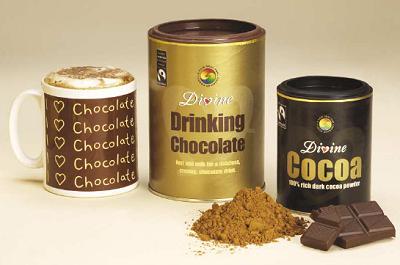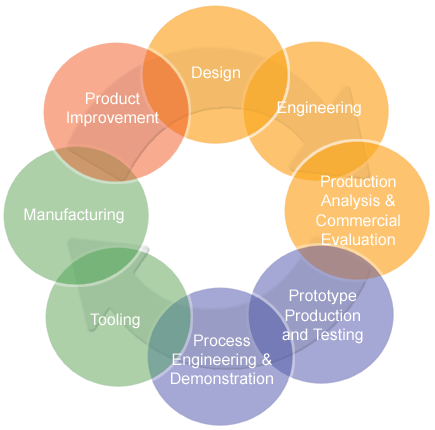Specific Target Groups |
 SMEs
key players in procurement, marketing, product design and development,
production, sales and customer care areas
SMEs
key players in procurement, marketing, product design and development,
production, sales and customer care areas
|
Specific Trainer's Profile |
Specific
skills and experience recommended for this training module are:
 Marketing
oriented profile Marketing
oriented profile
 Basic
knowledge of purchasing and production areas Basic
knowledge of purchasing and production areas
 Basic
knowledge of sustainable production, marketing and consumption Basic
knowledge of sustainable production, marketing and consumption
 Basic
knowledge of survey results on consumer attitude towards CSR Basic
knowledge of survey results on consumer attitude towards CSR
 General
awareness of local cause-related marketing campaigns General
awareness of local cause-related marketing campaigns
|
General Objective |
After
the training module, participants will be able to better understand the
importance of long term relationship with suppliers and business
partners, identify the main social and environmental aspects of products/services
and acknowledge the growing commercial opportunities that arise in this
area.
|
|
Specific Objectives
|
After
the training module participants will be able to:
 Understand
the positive impact of developing long term relationships with customers,
suppliers and business partners and identify possible areas of CSR related
benchmarking Understand
the positive impact of developing long term relationships with customers,
suppliers and business partners and identify possible areas of CSR related
benchmarking
 Recognize
the importance of socially responsible marketing Recognize
the importance of socially responsible marketing
 Identify
the main social and environmental aspects in the different phases of
product/service lifecycle: market research, design, development,
production, distribution, consumption and disposal Identify
the main social and environmental aspects in the different phases of
product/service lifecycle: market research, design, development,
production, distribution, consumption and disposal
 Identify
products that respond to specific needs of minority or handicapped groups Identify
products that respond to specific needs of minority or handicapped groups
 Identify
business opportunities for socially and environmentally responsible
products/services Identify
business opportunities for socially and environmentally responsible
products/services
 Identify
some of the local cause related marketing campaigns Identify
some of the local cause related marketing campaigns
 Evaluate
the CSR related market opportunities for their organization and establish
at least one concrete initiative in this area Evaluate
the CSR related market opportunities for their organization and establish
at least one concrete initiative in this area
|
Theoretical
Contents / Learning Contents |
Theoretical
Contents
in the module “Marketplace” should be introduced and discussed in
relation to Corporate Social Responsibility (CSR) in general, using, as
methodological approach the “CSR Knowledge Map”.
| Customer
behaviour and brand sustainability |
|
Public opinion, media and ONGs continuously scrutinise global
brands in search of any kind of misbehaviour. Global companies and
brands need to be responsible to be sustainable. But in what way
does this also apply to SMEs?
Today’s customers are becoming increasingly demanding about
social and economical performance of products and services they
buy.
Although
they are seldom willing to pay any extra money for it, customers
want companies to market safer, social and environmentally
friendly products.
|
 |
| Responsible
Marketing |
|
It sometimes happens that marketing professionals tend to
exaggerate (or omit) on purpose relevant information for the
consumer.
On
the other and, some delicate sectors like tobacco, pharmaceuticals,
children entertainment, food (candies, snacks), soft drinks,
liquor and others are been imposed (or self imposing) rigid codes
of conduct, in order to avoid damage to public health.
|
 |
| Relationships
with suppliers and business partners |
|
Globalisation led
to a growing movement of outsourcing and production delocalisation,
but multinational companies can no longer afford to take advantage
of unacceptable working conditions, social disruption or serious
environmental damage in less regulated countries, without risking
massive boycotts on their products. Examples can be found in
textile and apparel industries.
Big companies are increasingly demanding their SME suppliers to
assume minimum levels of working conditions and some of them are
even offering to help in the process.
SMEs can use the same logics with their business partners,
including individuals that gravitate around them. On the other
hand, they can also positively influence their bigger partners /
corporate clients in being responsible.
|
 |
| Corporate
Social
Opportunity |
|
There is clearly
room for new social and environmental friendly products / services,
which can be inspired by constructive stakeholder dialogue.
Unserved markets can be developed with new approaches, based on
new business models and innovative offers, using new distribution
schemes and new partnership logics.
SMEs
flexibility can give then a clear advantage in reaching these
emerging niche opportunities.
|
 |
| Product
lifecycle approach |
|
Social
and environmental impact assessment should be introduced at the
initial phases of product development (market research, conception
and design) and then accompany it through the whole lifecycle.
|
 |
| Accessibility
and design for all |
|
This
is another area where early adoption of accessibility criteria is
clearly decisive. Some consumer groups have special needs that can
only be satisfied by products and services with specific
requirements. Examples of these can be found in information and
communication technologies, building design, home appliances or
transportation. Unfortunately, regulations in this area are not
always respected, sometimes due to ignorance, others to economic
constraints.
|
 |
| Social
and environmental labels and awards |
|
There
are initiatives at all levels (worldwide, international, national,
regional and local) to promote and recognize company efforts in
these two areas. The most significant ones should be presented to
the participants, including a general description of the subject,
the names and contacts of the supporting organizations and the
identification of the award winning companies / products.
|
 |
| Cause-related
Marketing |
|
Cause-related
marketing campaigns are growing steadily in different countries
and sectors. There is strong evidence that, if they’re good,
these campaigns can give an important boost on sales. Using the
CSR glossary definitions, the trainer should establish a clear
difference between “sponsorship” and “cause-related
marketing”
|
 |
|
Module Structure |
 |
Opening,
getting acquainted
|
 |
Presentation
of the objectives/goals and contents of the training module |
 |
General
information about CSR and positioning the training module into the
broad CSR problematic (“CSR Knowledge Map”) |
 |
Learning
content topics: |
|
 |
Customer
behaviour and brand sustainability |
|
|
|
General
consumers opinion on Corporate Responsibility
|
|
|
|
Difference
between opinion and behaviour
|
|
|
|
Results
of Mori survey 2000 (CSR Europe) or any available surveys |
|
 |
Relationships
with suppliers and business partners
|
|
|
|
Positive
impact in business of long term relationships
|
|
|
|
Influence
of big companies in their suppliers habits
|
|
|
|
Examples
of vertical integration of good practices
|
|
 |
Product
lifecycle approach |
|
|
|
Importance
of incorporating it in the initial phases of product development
|
|
|
|
Examples
for each phase of product lifecycle: market research, design,
development, production, distribution, consumption and disposal |
|
 |
Accessibility
and design for all |
|
|
|
Weight
and importance of handicapped people in the community
|
|
|
|
Handicapped
as a group of consumers with specific needs |
|
|
|
Importance
of incorporating accessibility specifications it in the initial
phases of product development
|
|
|
|
Examples
of various products and services designed for all |
|
 |
Responsible
Marketing
|
|
|
|
Customer
expectation management – fulfilling the promises |
|
|
|
Honesty
and fairness
|
|
|
|
Consumer
security
|
|
|
|
Marketing
and children |
|
|
|
Responsible
promotion, distribution, pricing and market research
|
|
|
|
Self-regulation
codes of conduct
|
|
|
|
Examples
of self-regulation marketing/advertising codes |
|
 |
Cause-related
Marketing |
|
|
|
How
to establish win-win partnerships
|
|
|
|
Importance
of communication |
|
|
|
Measurement
of results and community impact |
|
|
|
Examples
of local cause-related marketing campaigns |
|
 |
Social
and environmental labels and awards |
|
|
|
Brief
description of initiatives, names and contacts of the supporting
organizations and, if possible, identification of the award winning
companies/products
|
 |
Evaluation
of the training module and offering support for implementation |
|
|
|
|
|
Methods
and Practical Training Activities |
| Definition
of the kind of pedagogical methods to be used |
The
trainer will use the following main pedagogical methods:
 Theoretical
exposition Theoretical
exposition
 Development
and discussion of participants own situation and case studies (working
groups) Development
and discussion of participants own situation and case studies (working
groups)
 Development
and presentation of exercises (individual and in working groups) Development
and presentation of exercises (individual and in working groups)
| Definition
of the practical training activities to be developed |
For
the Standard
Programme (4h) it is
recommended to develop the following practical training activities:
 Presentation,
development and discussion of Exercises 5.1, 5.2. and 5.3. Presentation,
development and discussion of Exercises 5.1, 5.2. and 5.3.
 Presentation,
development and discussion of Case Study nº 8 Presentation,
development and discussion of Case Study nº 8
 Presentation,
development and discussion of Exercise 5.4. Presentation,
development and discussion of Exercise 5.4.
 Presentation,
development and discussion of Case Study nº 9 Presentation,
development and discussion of Case Study nº 9
 Transfer
into practice (Preparation of the implementing of marketplace practices
into the participants own situation) Transfer
into practice (Preparation of the implementing of marketplace practices
into the participants own situation)
|
Didactical/Pedagogical Resources/Material |
 Flipchart
Flipchart
 Beamer
(video projector) Beamer
(video projector)
 Computer Computer
 TV
and Video/DVD (extended programme) TV
and Video/DVD (extended programme)
 CSR
Knowledge Map CSR
Knowledge Map
 Exercises
5.1., 5.2, 5.3 and 5.4. Exercises
5.1., 5.2, 5.3 and 5.4.
 Case
Studies nº 8 and nº 9 Case
Studies nº 8 and nº 9
 Participant’s
Feedback Questionnaire Participant’s
Feedback Questionnaire
 “Corporate
Social Responsibility – Awareness-raising questionnaire”, European
Commission – D.G. Enterprise, 2004 “Corporate
Social Responsibility – Awareness-raising questionnaire”, European
Commission – D.G. Enterprise, 2004
Further
Study Material to be given to the participants
 Corporate Social
Responsibility: State of the Art, 2004 (developed within the framework of
the Leonardo da Vinci Pilot Project “CSR/SME - Promoting Social
Responsibility in Small and Medium Size Enterprises” and available in
the six countries involved: AT, EE, HU, IT, NL, PT)
Corporate Social
Responsibility: State of the Art, 2004 (developed within the framework of
the Leonardo da Vinci Pilot Project “CSR/SME - Promoting Social
Responsibility in Small and Medium Size Enterprises” and available in
the six countries involved: AT, EE, HU, IT, NL, PT)
 CSR
Glossary, 2005 (developed within the framework of the Leonardo da Vinci
Pilot Project “CSR/SME - Promoting Social Responsibility in Small and
Medium Size Enterprises”), Subjects: Business Ethics; Community
Involvement; Human Rights; Organizations, Initiatives and Guidelines;
Sustainable Production and Consumption CSR
Glossary, 2005 (developed within the framework of the Leonardo da Vinci
Pilot Project “CSR/SME - Promoting Social Responsibility in Small and
Medium Size Enterprises”), Subjects: Business Ethics; Community
Involvement; Human Rights; Organizations, Initiatives and Guidelines;
Sustainable Production and Consumption
 Guidelines
for multinational enterprises, OECD Guidelines
for multinational enterprises, OECD
 “Corporate
Social Responsibility – Awareness-raising questionnaire”, European
Commission – D.G. Enterprise, 2004 (developed within the framework of
the “Pan-European awareness-raising campaign on CSR”) “Corporate
Social Responsibility – Awareness-raising questionnaire”, European
Commission – D.G. Enterprise, 2004 (developed within the framework of
the “Pan-European awareness-raising campaign on CSR”)
|
Duration |
|
Module
Structure
|
Duration
|
Accumulated
Time
|
Notes
|
|
Beginning
|
End
|
|
Opening,
getting acquainted
|
15
m.
|
0:00
|
0:15
|
Adaptable
according to the group circumstances, namely: participants profile,
integrated or stand alone module, existence of newcomers, etc.
|
|
Presentation
of the objectives/goals and contents of the training module
|
05
m.
|
0:15
|
0:20
|
|
|
Theoretical
introduction to the training module - General information about CSR
and positioning the training module into the broad CSR problematic
|
05
m.
|
0:20
|
0:25
|
Using
the “CSR Knowledge Map”.
|
|
Customer
behaviour
Brand
sustainability
Responsible
Marketing
|
10
m.
|
0:25
|
0:35
|
|
|
Exercise
5.1. – “Safety product policy”
|
10
m.
|
0:35
|
0:45
|
|
|
Exercise
5.2. – “Expiry date: risk or opportunity?” (Role play)
|
30
m.
|
0:45
|
1:15
|
|
|
Relationships
with competitors, suppliers and business partners
|
10
m.
|
1:15
|
1:25
|
|
|
Exercise
5.3. – “Relationship with suppliers – Crossing the line”
|
20
m.
|
1:25
|
1:45
|
|
|
Product
lifecycle approach
Accessibility
and design for all
Social
and environmental labels and awards
Cause-related
Marketing
|
15
m.
|
1:45
|
2:00
|
|
|
|
|
|
|
|
|
BREAK
|
15
m.
|
2:00
|
2:15
|
|
|
|
|
|
|
|
|
Case
Study nº 8
|
20
m.
|
2:15
|
2:35
|
|
|
Exercise
5.4. – “Use of confidential information”
|
20
m.
|
2:35
|
2:55
|
|
|
Case
Study nº 9
|
20
m.
|
2:55
|
3:15
|
|
|
Major
benefits of a socially responsible marketing policy and procedures:
topics, debate and conclusions
|
10
m.
|
3:15
|
3:25
|
|
|
Identification
of organizational gaps in responsible marketing and commitment to
action
|
20
m.
|
3:25
|
3.45
|
Offering
of support for implementation
|
|
Evaluation
|
15
m.
|
3:45
|
4:00
|
Using
the “Participant’s Feedback Questionnaire” or any other tool
already in use in the VET organisation.
|
|
END
|
|
|
|
|
Although the standard duration
suggested for this training module is 4 hours, we believe that its content
is rich enough to expand the course duration up to an entire working day.
|





